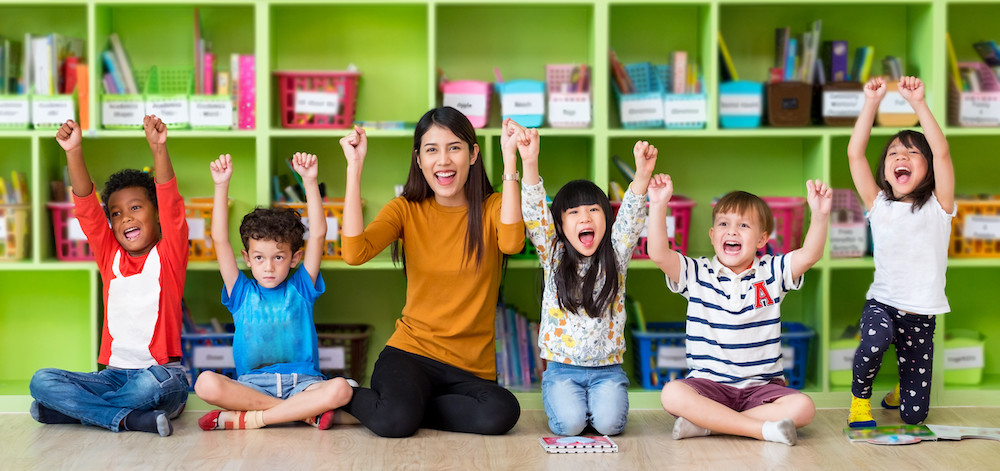
Early childhood education plays a pivotal role in a child’s development, as it sets the foundation for their lifelong learning journey. To ensure that young learners receive the best possible start, it is crucial to establish age-appropriate learning goals and objectives. These goals should take into account the developmental stage of the child, their individual needs, and their unique learning style. In this blog, we will explore the significance of setting developmentally appropriate learning objectives for children at various stages of early childhood and how a Learning Management System (LMS) with a plethora of games and interactive activities can help achieve these goals.
The Importance of Age-Appropriate Learning Goals
Acknowledging Developmental Differences
Every child is unique and develops at their own pace. It is crucial to recognise that a one-size-fits-all approach to education is not suitable for early childhood. Young children progress through various stages of development, including cognitive, social, emotional, and physical growth. Setting age-appropriate learning goals ensures that educational experiences align with a child’s individual needs and developmental stage, promoting optimal learning outcomes.
Fostering a Love for Learning
When children are engaged in learning experiences that match their abilities and interests, they are more likely to develop a love for learning. Age-appropriate learning goals can help make learning enjoyable and rewarding, nurturing a child’s curiosity and motivation to explore new concepts.
Building Confidence and Competence
Achieving goals that are appropriate for their age and abilities allows children to build confidence and a sense of competence. This sense of accomplishment can lead to higher self-esteem and a positive attitude towards learning, which is essential for their future educational journey.
Age-Appropriate Learning Goals for Different Stages of Early Childhood
- Infancy (0-2 years)
During the first two years of life, infants undergo rapid physical and sensory development. Learning objectives for this stage include:
- Developing gross and fine motor skills, such as rolling, crawling, and grasping objects.
- Building sensory awareness through exploration of sights, sounds, textures, and tastes.
- Forming secure attachments with caregivers to develop trust and emotional stability.
- Toddlerhood (2-3 years)
Toddlers are known for their boundless energy and natural curiosity. Learning goals at this stage include:
- Expanding vocabulary and language skills through reading, talking, and singing.
- Developing basic problem-solving and critical thinking skills through puzzles and games.
- Encouraging social interaction and cooperation with peers to foster emotional intelligence.
- Preschool (3-5 years)
Preschoolers are ready for more structured learning experiences. Age-appropriate learning goals for this stage include:
- Early literacy and numeracy skills, such as recognizing letters, numbers, and shapes.
- Enhancing fine motor skills for activities like drawing and coloring.
- Encouraging creativity and imagination through arts and crafts.
- Kindergarten (5-6 years)
Kindergarten marks the transition to formal education. Learning objectives for this stage include:
- Developing reading and writing skills, including letter recognition and basic phonics.
- Advancing mathematical concepts, such as counting, addition, and subtraction.
- Promoting independence and problem-solving abilities to prepare for elementary school.
How Our Learning Management System Can Help
To support educators, parents, and caregivers in setting and achieving age-appropriate learning goals for children, our Learning Management System offers a wide array of games and interactive activities designed for each stage of early childhood.
Comprehensive Content Library
Our LMS features a vast library of educational content tailored to specific developmental stages. This content includes interactive games, videos, and activities that align with age-appropriate learning goals, ensuring that children engage in activities that are suitable for their individual needs.
Real-Time Progress Tracking
Our LMS allows educators and parents to monitor a child’s progress in real time. This feature enables them to make informed adjustments to the child’s learning plan and provide additional support when necessary.
Parental Engagement
We understand that parents play a crucial role in a child’s education. Our LMS facilitates parental involvement by providing resources, suggestions, and progress updates to ensure that learning goals are reinforced at home.
Setting age-appropriate learning goals is paramount to the success of early childhood education. Recognising developmental differences and tailoring educational experiences to each child’s unique stage of development can foster a love for learning, build confidence, and provide a strong foundation for future academic success. Our Learning Management System, with its extensive library of games and interactive activities, is a valuable tool in achieving these goals. By offering a personalised learning experience for children at various stages of early childhood, it ensures that each child receives the education they need to thrive and grow.
The BubbleBud Kids preschool management system has had a significant impact on hundreds of preschools worldwide. With our comprehensive solution, schools have experienced a substantial improvement in their administrative efficiency, parent-teacher communication, and overall educational quality. But that’s not all; we are also excited to introduce our cutting-edge learning management system. This integrated platform includes an array of digital educational games and learning activities that can be tailored to meet the unique needs of any preschool. From interactive lessons to engaging activities, this system ensures that young learners have access to a dynamic and personalised educational experience. Moreover, our preschool management system offers the valuable feature of sharing teacher training materials and teaching aids, allowing educators to access and exchange best practices across different schools or branches. Whether you’re an individual preschool or a part of a larger school chain, our system is designed to streamline processes and elevate the quality of early childhood education across the board.
